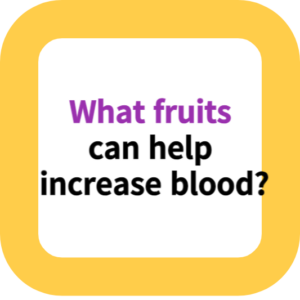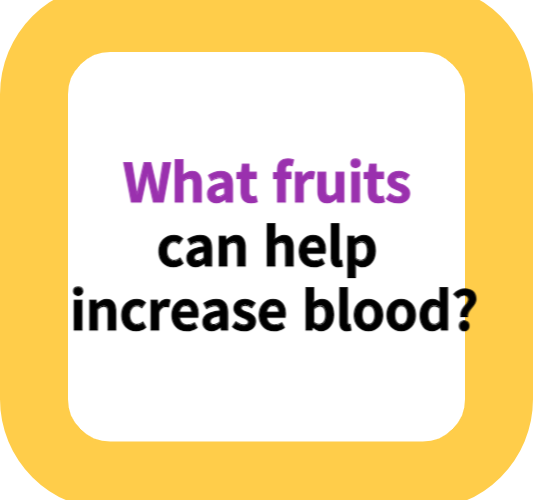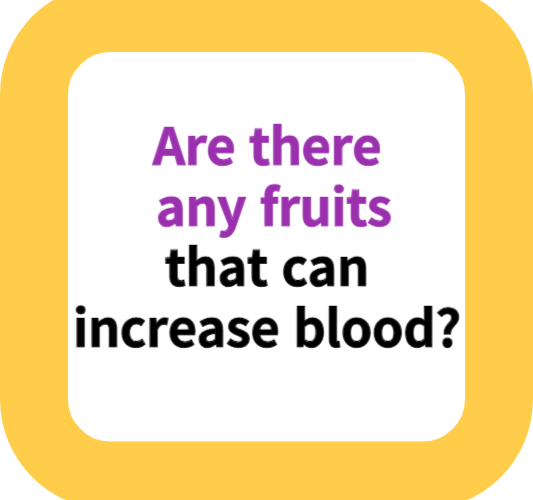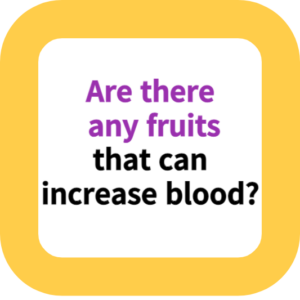What fruits can help increase blood?
Welcome to our health and wellness blog where we dive into the fascinating world of nutrition and its impact on blood health! Our latest post explores an array of fruits, each a powerhouse of essential nutrients, and their specific roles in enhancing blood quality.
From the antioxidant-rich pomegranate to the vitamin-packed oranges, we discuss how these natural delights contribute to increasing red blood cell production, improving hemoglobin levels, and ensuring overall cardiovascular health.
Whether you’re looking to combat anemia, boost your iron levels, or simply maintain a healthy circulatory system, our blog offers insightful information and practical tips on incorporating these fruits into your daily diet. Join us as we unravel the secrets of nature’s best offerings for a healthier, more vibrant life!
What fruits can help increase blood?

Introduction: The Vital Role of Blood in Human Health
Blood, a crucial fluid in the human body, performs the indispensable task of transporting oxygen and nutrients to every part of the body, ensuring the proper functioning of various systems.
The quality of blood significantly impacts overall health, being influenced by the quantity and health of red blood cells, white blood cells, and platelets. A nutritious diet, particularly rich in fruits, plays a key role in maintaining and improving blood quality.
This article delves into a variety of fruits that are not only nutritious but are specifically beneficial in enhancing blood health, thus contributing to the prevention of health issues like anemia, heart disease, and stroke.
1. Pomegranate: A Powerhouse of Antioxidants and Vitamin C
Pomegranate stands out as a superfood with its high antioxidant content and significant levels of vitamin C, essential for the production and maintenance of red blood cells. Its capacity to improve blood circulation is pivotal in preventing conditions like anemia.
Consuming pomegranate, particularly in juice form, offers a concentrated intake of these nutrients, aiding in blood vessel protection and reducing the risk of cardiovascular diseases. Its role in increasing hemoglobin levels and red blood cell count makes it a valuable addition to a heart-healthy diet.
2. Apples: A Blend of Iron, Vitamin C, and Fibre
Apples are renowned for their rich iron content, a critical component for hemoglobin production in blood. The presence of vitamin C in apples enhances the absorption of iron, making them an effective fruit for preventing anemia.
Additionally, apples are a source of antioxidants and fiber, contributing to the health of blood vessels and improving overall blood flow. The regular inclusion of apples in one’s diet can aid in the maintenance of healthy red blood cells and support cardiovascular health.
3. Kiwi: Vitamin C and K for Blood Health
Kiwi is a fruit abundant in vitamin C, vital for the efficient absorption of iron in the body, and vitamin K, necessary for the process of blood clotting. Its rich fiber content also plays a role in promoting digestive health and preventing constipation.
The high levels of vitamin C in kiwifruit are instrumental in the production of robust red blood cells. The nutrients in kiwi make it a valuable fruit for maintaining good blood health.
4. Berries: Rich in Antioxidants and Vitamin C
Berries, including strawberries, raspberries, and blueberries, are treasure troves of antioxidants and vitamin C. These nutrients are key in enhancing the quality of blood.
Their iron content is crucial in the production of hemoglobin. Regular consumption of berries can be a delicious way to prevent anemia and to promote healthy blood circulation, thanks to their anthocyanins, which protect blood vessels and reduce cardiovascular disease risks.
5. Bananas: Iron and Vitamin B6 for Red Blood Cell Production
Bananas are beneficial in blood health due to their iron content, which is essential for hemoglobin production. They are also rich in vitamin B6, necessary for the production of red blood cells. Incorporating bananas into one’s diet can effectively combat anemia and contribute to the creation of healthy blood cells.
6. Guava: Vitamin C-Rich for Red Blood Cell Enhancement
Guava, with its high vitamin C content, is instrumental in boosting red blood cell production. Its iron content aids in hemoglobin production, while its fiber richness improves digestion, making it a holistic fruit for blood health.
7. Grapes: Iron and Antioxidants for Blood Quality
Grapes are a good source of iron, vital for hemoglobin creation, and are abundant in antioxidants that enhance blood quality. Their polyphenol content is particularly beneficial in protecting blood vessels and reducing the risk of heart diseases. Grapes also aid in blood flow and reduce the risk of blood clots, contributing to overall cardiovascular health.
8. Oranges: Vitamin C and Folate for Blood Cell Production
Oranges are a rich source of vitamin C and folate, both crucial for the production of red blood cells. Regular consumption can help prevent anemia and support overall blood health.
9. Watermelon: A Source of Vitamin C, Iron, and Lycopene
Watermelon, with its richness in vitamin C and iron, supports red blood cell and hemoglobin production. The presence of lycopene, an antioxidant, further enhances the quality of blood, making watermelon a refreshing and healthy choice.
10. Avocado: Vitamin E and Healthy Fats for Vascular Health
Avocado is loaded with vitamin E, an antioxidant that protects blood vessels from damage. Its healthy fats also play a role in reducing the risk of heart diseases, making it a nutritious fruit for maintaining vascular health.
11. Citrus Fruits: Essential Vitamin C for Healthy Red Blood Cells
Citrus fruits like oranges, lemons, and grapefruits, rich in vitamin C, are essential for the production of healthy red blood cells. They also enhance the absorption of iron from plant-based sources, contributing to overall blood health.
Conclusion: The Role of Fruits in Enhancing Blood Quality
Fruits are invaluable in providing the necessary nutrients to improve blood quality. Varieties such as pomegranate, apples, kiwi, berries, bananas, guava, grapes, oranges, and watermelon are rich in iron, vitamin C, and other essential nutrients necessary for red blood cell and hemoglobin production.
While fruits alone cannot significantly increase blood volume, their regular consumption can prevent anemia and enhance blood quality. A balanced diet, including a variety of fruits and vegetables, is crucial for optimal health, ensuring healthy blood flow and cell production.



